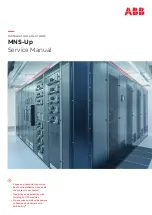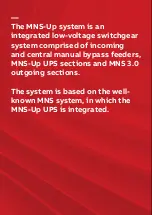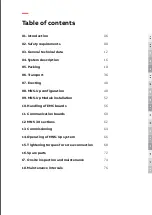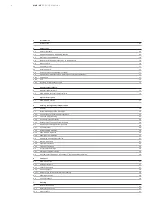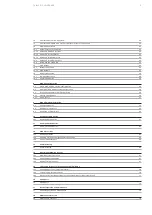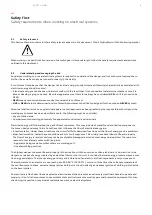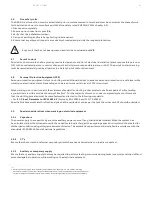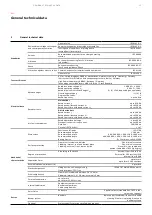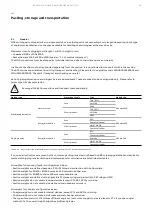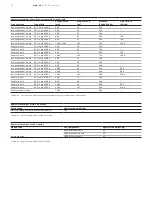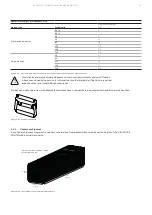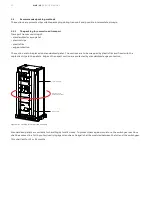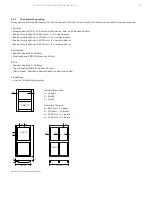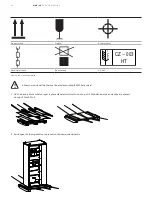
9
S A FE T Y FI R S T
—
Safety first
Safety requirements when working on electrical systems
2.1
Safety relevance
This Service Manual contains further safety relevant aspects in the document. This is highlighted with the following symbol:
!
When working on specific tasks or areas in the switchgear it is mandatory to follow the safety requirements and advises
outlined in this document.
2.2
Understanding and managing the risk
Any person working on or near electrical systems is required to understand the danger and risk such work may impose to
his/her life as well as to any person and property in the vicinity.
It is of utmost importance that the danger of electrical energy is understood and following characteristics associated with
electrical energy should be noted:
• Electrical energy cannot be seen, heard or smelt, with the result that it is not possible to determine whether a circuit is
alive or dead by relying on senses. Electrical apparatus must therefore always be considered
LIVE
until it is proved to be
DEAD.
•
DEAD
means zero volts between conductor and earth is confirmed.
•
LIVE
or
DEAD
status is determined and confirmed by equipment specifically designed for the purpose,
NEVER
by touch.
Personnel shall not work on any electrical apparatus until approval has been granted by the responsible authority and the
working environment has been classified as safe, the following must be controlled:
• Any prohibited area,
• Compartments containing potentially live apparatus/conductors/and terminals.
Electrical energy will follow along the path of least resistance. This may include all metallic and conductive components,
the human body and many fluids. Conditions that influence the flow of electrical energy are:
• Intact Insulation. Under these conditions the circuit fulfils its designed function and the flow of energy can be predicted.
• Breached Insulation. Under these conditions a short circuit may occur. This could prove hazardous to life and property.
The flow of energy is random and may not be predictable. Damaged insulation must always be reported. There are two
reasons for accidental contact with live parts:
- Apparatus being made live whilst others are working on it,
- Unsafe working practices.
The highest danger to human life and property is the situation with the occurrence of an electrical arc. An electric arc is a
dangerous release of energy created by an electrical fault or short circuit. It contains thermal energy, pressure waves, acous-
tic energy and debris. The intense energy and very short duration of an electric arc flash represents a very unique event.
The temperature of an electric arc can reach up to 20 000 °C (35 000 °F), or two to three times the surface temperature of
the sun! Exposure to these extreme temperatures both burns the skin directly and causes ignition of clothing, which adds
to the burn injuries.
An electrical arc flash describes an explosive electrical event that presents an extremely significant hazard to people and
property. It is of vital importance to use suitable tools and instruments as well as personal protection equipment for com-
missioning, inspection or any kind of maintenance work on electrical systems.
Summary of Contents for MNS-Up
Page 6: ... 01 Introduction ...
Page 8: ... 02 Safety first ...
Page 12: ... 03 General technical data ...
Page 16: ... 04 System description ...
Page 18: ... 05 Packing storage and transportation ...
Page 36: ... 06 Transport ...
Page 40: ... 07 Erecting ...
Page 47: ...47 ERECTING ...
Page 48: ... 08 MNS Up configuration ...
Page 52: ... 09 MNS Up Module installation ...
Page 55: ...55 MNS UP MODULE INSTALL ATION ...
Page 56: ... 10 Handling of EMC boards ...
Page 59: ...59 HANDLING OF EMC BOARDS ...
Page 60: ... 11 Communication boards ...
Page 62: ... 12 MNS 3 0 sections ...
Page 64: ... 13 Commissioning ...
Page 66: ... 14 Operating of MNS Up system ...
Page 68: ... 15 Tightening torques for screw connection in MNS Up ...
Page 72: ... 16 Spare parts ...
Page 74: ... 17 Onsite inspection and maintenance ...
Page 76: ... 18 Maintenance intervals ...
Page 81: ...81 MAINTENANCE INTERVALS ...
Page 83: ......

